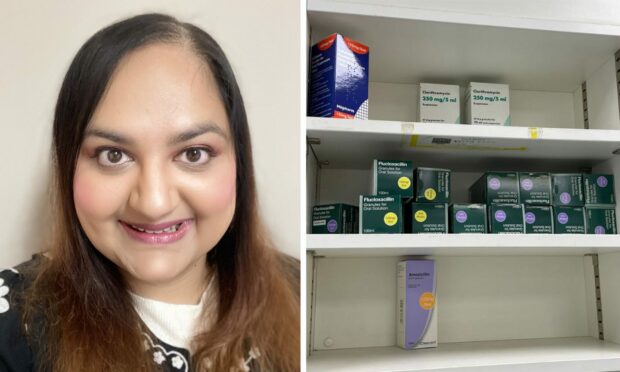A Fife pharmacist has expressed concerns over local shortages of antibiotics to treat Strep A infections.
Farzana Haq – who works in Dunfermline – describes the current situation as “chaos” and says she hasn’t seen anything like it in her 17-year career.
Her remarks come after First Minister Nicola Sturgeon revealed alternative drugs may have to be found to treat Strep A, with the Scottish Government issuing a supply alert notice to pharmacists amid soaring cases north of the border.
Ms Haq told The Courier: “There’s no sugar-coating it, it has been chaos.
“With certain liquid antibiotics, there absolutely is a significant supply issue.
“In my local area for the last eight to 10 days, we’ve seen that wholesalers are not supplying liquid penicillin, which is the first line medication for Strep A infections.
“Neither children or adults can get penicillin from us.
“I have never ever known that in my 17 years qualified as a pharmacist, to see that level of antibiotic shortage.
“Amoxicillin, which is usually a second-line treatment for Strep A infections and first line for other infections, has also gone out of stock.
“It’s just an unreal situation. It’s unbelievable.
“We’ve got people constantly on the phone asking if we have antibiotics in stock, when we’ll be getting it in, if we know anyone else who has it, the answer to which is all no.”
‘I was gobsmacked’
Ms Haq says she first noticed the shortage last Thursday after a day earlier watching Prime Minister’s Questions, at which PM Rishi Sunak insisted there were no supply issues.
She added: “Every Thursday I work at my local pharmacy down the road from where I live.
“When I went in last week, the first thing I did was look at the antibiotic shelves and there was no stock.
“I asked the girls what was happening and they said they weren’t getting bottles of penicillin or amoxicillin in. I was shocked.
“And I thought, if I was that shocked to hear that, the general public are going to have no idea.”
This was our antibiotic liquid shelf this morning. Now we have no amoxicillin and penicillin liquid at all in any strength & out of stock with out wholesalers. Also the majority of pharmacies in Scotland do not do Strep A throat swabs! #antibiotics #antibioticshortage pic.twitter.com/BFu7CrdBZn
— Farzana Haq (@PharmaZana) December 8, 2022
Ms Haq tweeted pictures of the limited stock on shelves to raise the public’s awareness.
On Wednesday, Public Health Scotland (PHS) revealed the total number of all Strep A cases in 2022 is higher than those seen in previous years.
She says: “I decided to take a picture and share it because Sunak told everyone there’s no issue.
“All that pressure is coming back on us from the public who are thinking, ‘Well, that’s not what we’ve been told by the government, they’re saying there’s no issue’.
“I thought when I went into the same branch today, it would be resolved. Maybe that was wishful thinking.
“I was gobsmacked when I came in today and they said ‘No, there’s still none and the tablets are now out of stock as well.'”
‘No one is going to go untreated’
While the senior clinical pharmacist wants the public to be aware of the current state of play, she still has words of reassurance for those concerned about shortages.
She says: “If anyone is in real need of antibiotics, there are alternatives.
“Where the liquid has run out, we’re using the solid forms such as tablets and capsules and really taking that time to crush or disperse the medicines and how to give it to children and what to mix it with.
“We have all that advice available for patients. I wouldn’t want to panic the general public.
“The important thing is hospitals have a good supply of antibiotics.
“If someone is really ill, they shouldn’t worry because if you’re admitted to hospital, you’ll get the antibiotics you need.
“There is a different supply chain that provides medications to hospitals which ensures they don’t suffer the same shortages.
“So, that is reassuring. No one who has a serious infection is going to go untreated.”
Several mums and dads from Tayside and Fife have contacted us about their difficulties accessing liquid amoxicillin to treat Strep A, with one Dundee parent facing a race across the city to find medication for their unwell child.
We told last week how NHS Tayside issued letters to parents, through schools, with advice about scarlet fever.
The Courier asked several local pharmacies including Boots, Lloyds and Davidson’s, whether or not they were experiencing Strep A antibiotics shortages.
They all told us liquid amoxicillin is in short supply, though there are stocks of tablets and capsules.
And pharmacists across England have also reported antibiotic shortages.
What are GPs saying about Strep A in Scotland?
Meanwhile, Perth-based GP Dr David Shackles – Joint Chair of RCGP (Royal College of General Practitioners) Scotland – has called on the Scottish Government to manage the public’s expectations of GPs amid “ongoing pressures”.
He says: “The higher number of scarlet fever and group A strep infections at this time means that GPs are being vigilant in looking to provide advice and to identify and treat potential A streptococcal infections.
“The serious, invasive cases of infection are thankfully still rare, and any parents concerned that their child is unwell should seek urgent medical attention.
“We understand parents will be concerned about this type of illness, particularly when some cases in other parts of the UK have had tragic outcomes, but it is important to note that invasive GAS infections are rare and the small number of cases reported in Scotland in recent weeks is so far not higher than in previous years.
“Some practices have been struggling to cope with the immense surge of demand that has arisen through upper respiratory tract infections, on top of the existing workforce shortages and workload pressures in these winter months.
“GPs and their teams must be available to see those patients who really need our care, but this week much of our efforts have been directed towards acute and often minor illnesses.
“RCGP Scotland urges the Scottish Government to have a national conversation with the public to explain what general practice can realistically be expected to deliver under ongoing pressures.”














Conversation